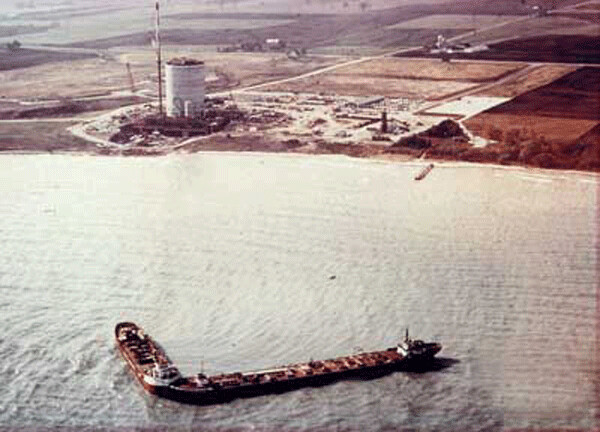Proposal for Nuclear Waste Dump and Cross-country Radioactive Shipments Called “Illegal”

Ten citizens’ organizations* and two industry groups have blasted plans and an application by “Holtec International” for a license to build the world’s largest radioactive waste dump - in southeast New Mexico. The high-level waste fuel rods - misleadingly called “spent” fuel - would come from 60 different sites across the U.S. where it was produced inside 105 nuclear reactors. If licensed, the “parking lot dump” would lead to tens of thousands of cross-country shipments of the waste -- by rail, truck, and boat/barge - for decades.
In Wisconsin, federal plans actually involve placing waste casks on barges near the closed Kewaunee reactor, and floating the ferociously radioactive material on Lake Michigan down to Milwaukee. (The Edmund Fitzgerald plan?) Official waste transport routes show that containers would move across nearly 90% of U.S. Congressional districts, going through neighborhoods, cities, farmlands, ocean-fronts and over major lakes and rivers. Attorney Terry Lodge, representing seven of the groups, said in a recent New Mexico hearing that, “The Holtec proposal is a corporate welfare trough that will make the nuclear waste problem in this country worse, putting millions of people along transport routes at unnecessary risk.”
Nuclear reactor waste is the hottest, most concentrated radioactive material (except for Navy warship propulsion reactor waste), and some of the deadliest cancer-causing material on Earth. Exposure to unshielded waste can kill in minutes, and it remains radioactive for millions of years.
In formal intervention proceedings, the 10 environmental groups, an oil company and a waste management firm filed 40 objections, demanding that the Nuclear Regulatory Commission’s Atomic Safety and Licensing Board halt Holtec’s licensing. Lawyers for the groups say the plan can’t possibly be considered lawful. The U.S. Nuclear Waste Policy (NWPA) Act allows the Department of Energy (DOE) to take possession of commercial reactor waste, but only at a permanent underground repository. A “title and liability transfer” to the DOE at the so-called “interim” above-ground site proposed by Holtec is not allowed. The precaution was meant to prevent temporary surface storage from becoming permanent. Holtec’s proposed “interim” site is not suitable for long-term waste isolation and, in the view of Holtec’s challengers, it is not even suitable for short-term storage.
The Holtec license application says the lethal waste at its New Mexico site would be owned by either the US Department of Energy (DOE) or the nuclear power companies that made it. But at the New Mexico hearing, Holtec’s lawyer, Jay Silberg, admitted that under current law, DOE cannot take title/ownership of the waste at an “interim” storage site. The admission prompted Diane Curran, attorney for Beyond Nuclear, to say, “We should not even have to argue this hypothetical case. We call on the licensing board to dismiss the application.”
Holtec implies in its application that the reactor waste’s owners would have to retain “title” to its waste, pay to have it shipped, and retain financial and accident liability over the material. This is a business proposal the utility owners already rejected in the case of a Utah dump proposal that failed.
Holtec has admitted it has no way to repair cracked waste storage or transport casks, but hopes for the best. Sierra Club lawyer Wallace Taylor, complained at the hearing that, “It is irresponsible and illegal to grant a license for 20, 40 or 60 years and ignore that the waste will be dangerous for centuries longer with no plans to continue managing and isolating it.”
Diane D’Arrigo, Radioactive Waste Project Director at Nuclear Information and Resource Service, pointed out three different licensing flaws. “New Mexico could end up holding the faulty waste casks, threatening the state’s thriving dairy, pecan farming and ranching businesses. Mixing high-level radioactive waste with the booming Permian Basin oil and gas industry is a recipe for disaster. Everyone along the transport routes would be at risk because insurance policies never cover radioactive accidents or incidents, not one. Check your own auto, renters and homeowners policies,” she advised.
Approximately 40 objections were filed with the Atomic Safety and Licensing Board, including: environmental racism/injustice; danger of contaminating water; inadequate radioactive waste containers and storage systems; inability to inspect, monitor or repackage damaged waste and/or containers; condition of the waste after extended storage; eventual abandonment costs and funding; future permanent waste site when the temporary storage license expires; and needless transport endangerment.
The 3-judge ASLB panel could decide sometime in April which groups have “standing” to intervene, and which of the 40 objections will be considered.
*Critics: Public Citizen, Sierra Club, Beyond Nuclear, Alliance for Environmental Strategies (NM), Citizens for Alternatives to Chemical Contamination (MI), Citizens Environmental Coalition (NY), Don’t Waste Michigan (MI), Mothers for Peace (CA), Nuclear Energy Information Service (IL), Nuclear Issues Study Group (NM), Faskin Oil, NAC International.